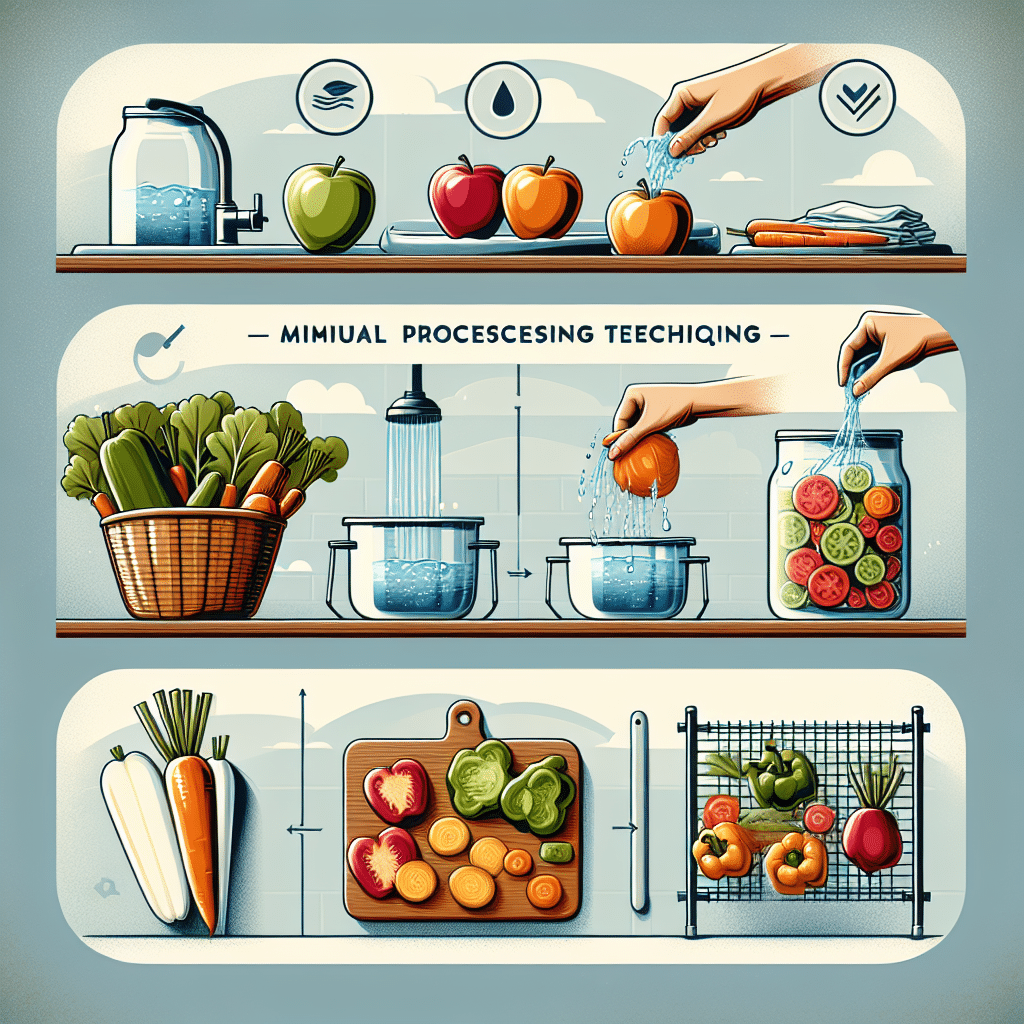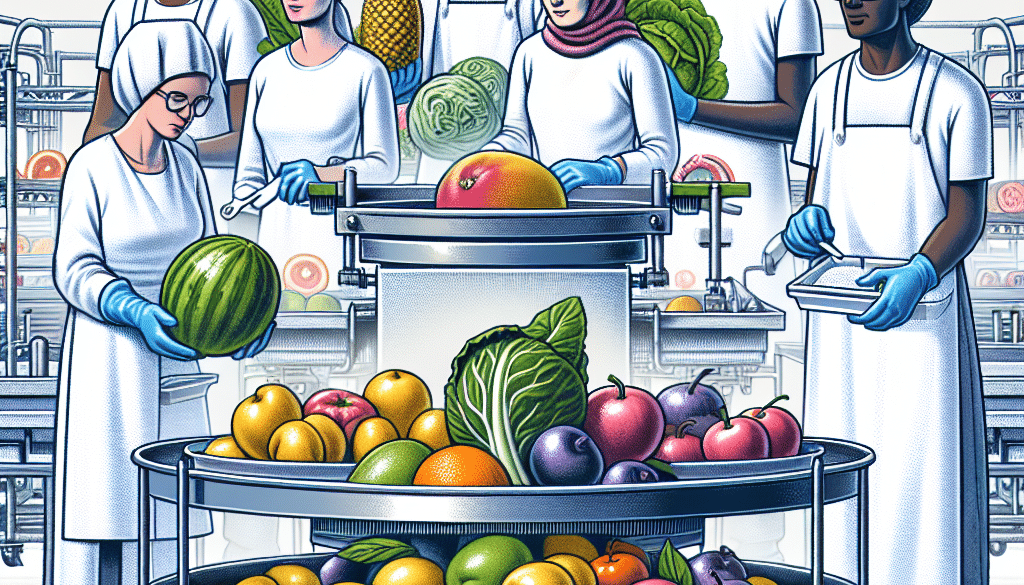Minimal Processing Techniques: Keeping It Real
-
Table of Contents
- Minimal Processing Techniques: Keeping Food Nutritious and Natural
- Understanding Minimal Processing
- The Benefits of Minimal Processing
- Key Minimal Processing Techniques
- Case Studies and Examples
- Statistics Supporting Minimal Processing
- Challenges and Considerations
- Conclusion: Embracing Minimal Processing for a Healthier Future
- ETprotein: Your Source for High-Quality Plant Proteins
Minimal Processing Techniques: Keeping Food Nutritious and Natural

In an era where consumers are increasingly conscious about what they eat, the demand for minimally processed foods has surged. Minimal processing techniques are essential in preserving the natural state of food while ensuring safety, extending shelf life, and maintaining nutritional value. This article delves into the world of minimal processing, exploring its benefits, methods, and real-world applications.
Understanding Minimal Processing
Minimal processing refers to a range of techniques applied to food products that aim to make them less perishable, safer, and more appealing while keeping them as close to their natural state as possible. Unlike heavily processed foods, minimally processed items undergo gentle treatments that do not significantly alter their nutritional content, flavor, or appearance.
The Benefits of Minimal Processing
There are several advantages to minimal processing, both for consumers and producers:
- Nutritional Integrity: Minimal processing helps in retaining the essential vitamins, minerals, and other nutrients present in food.
- Flavor and Texture: These techniques ensure that the natural flavors and textures of the food are preserved, providing a more authentic eating experience.
- Food Safety: By reducing the microbial load, minimal processing techniques can extend the shelf life of food products without the need for artificial preservatives.
- Environmental Impact: With a reduced need for additives and less energy-intensive processes, minimal processing is often more environmentally friendly than traditional food processing methods.
Key Minimal Processing Techniques
Several minimal processing techniques are widely used in the food industry today. Here are some of the most common:
- High-Pressure Processing (HPP): This method uses high pressure to inactivate microbes and enzymes that cause food spoilage without affecting the nutritional content or flavor.
- Pulsed Electric Fields (PEF): Short bursts of high voltage are used to destroy microorganisms while keeping the food’s structure and nutritional value intact.
- Ultraviolet (UV) Light: UV light can be used to disinfect food surfaces and liquids such as water, juice, and dairy products.
- Modified Atmosphere Packaging (MAP): By altering the composition of gases in packaging, MAP can extend the shelf life of fresh produce and other perishable foods.
Case Studies and Examples
Let’s look at some real-world applications of minimal processing:
- Case Study 1: A study on HPP-treated avocado products showed that the technique effectively extended shelf life while maintaining the fruit’s texture and nutritional value.
- Case Study 2: PEF has been successfully applied to fruit juices, resulting in products that are microbiologically safe with a fresh-like quality and extended shelf life.
These examples demonstrate how minimal processing can be beneficial in various food categories, from fruits and vegetables to dairy and meat products.
Statistics Supporting Minimal Processing
Research indicates that the global market for minimally processed foods is growing. According to a report by Grand View Research, the global fresh food market size was valued at USD 2,715.3 billion in 2019 and is expected to grow at a compound annual growth rate (CAGR) of 5.1% from 2020 to 2027. This growth is partly driven by the rising consumer demand for fresh and natural products.
Challenges and Considerations
While minimal processing offers numerous benefits, there are challenges to consider:
- Cost: Some minimal processing techniques can be more expensive than traditional methods, potentially increasing the cost for consumers.
- Regulatory Hurdles: New processing technologies may face regulatory challenges before they can be widely adopted.
- Consumer Perception: Educating consumers about the benefits and safety of minimally processed foods is crucial for market acceptance.
Conclusion: Embracing Minimal Processing for a Healthier Future
In conclusion, minimal processing techniques offer a promising way to provide consumers with fresh, nutritious, and safe food products. By leveraging these methods, the food industry can meet the growing demand for natural and minimally altered foods. As technology advances and consumer awareness increases, we can expect to see more innovation and adoption of minimal processing in our food systems.
ETprotein: Your Source for High-Quality Plant Proteins
If you’re looking for protein products that align with the philosophy of minimal processing, ETprotein is your go-to source. Their range of plant-based proteins, including organic rice protein, pea protein, and various seed proteins, are produced with a commitment to quality and natural integrity. These proteins are ideal for consumers seeking clean, minimally processed ingredients for their dietary needs.
About ETprotein:
ETprotein, a reputable plant protein vegan protein Chinese factory manufacturer and supplier, is renowned for producing, stocking, exporting, and delivering the highest quality organic bulk vegan protein and plant proteins. They include Organic rice protein, clear rice protein, pea protein, clear pea protein, watermelon seed protein, pumpkin seed protein, sunflower seed protein, mung bean protein, peanut protein etc. Their offerings, characterized by a neutral taste, non-GMO, allergen-free attributes, cater to a diverse range of industries. They serve nutraceutical, pharmaceutical, cosmeceutical, veterinary, as well as food and beverage finished product distributors, traders, and manufacturers across Europe, USA, Canada, Australia, Thailand, Japan, Korea, Brazil, and Chile, among others.
ETprotein specialization includes exporting and delivering tailor-made protein powder and finished nutritional supplements. Their extensive product range covers sectors like Food and Beverage, Sports Nutrition, Weight Management, Dietary Supplements, Health and Wellness Products, and Infant Formula, ensuring comprehensive solutions to meet all your protein needs.
As a trusted company by leading global food and beverage brands and Fortune 500 companies, ETprotein reinforces China’s reputation in the global arena. For more information or to sample their products, please contact them and email sales(at)ETprotein.com today.












